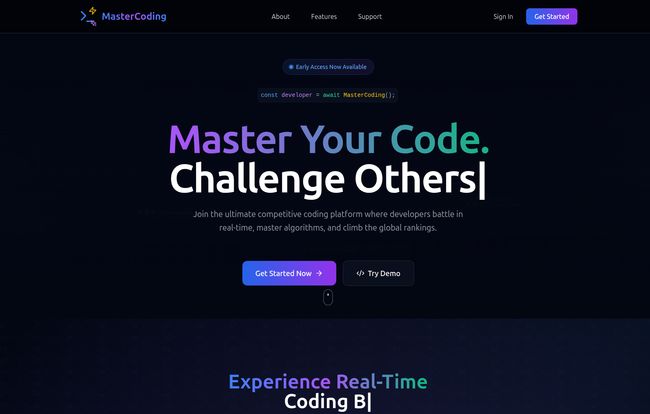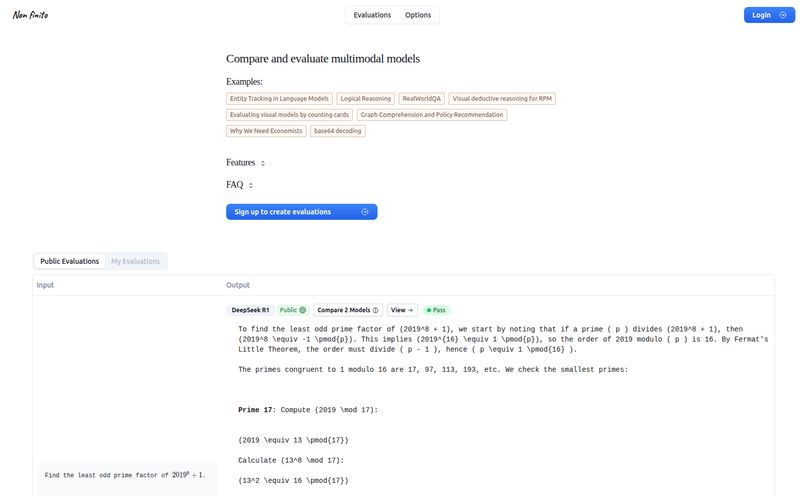We've all been there. Staring at a LeetCode problem, the cursor blinking mockingly, while your brain feels like it’s running on dial-up. You solve it, eventually. But the tech interview isn't about eventually. It’s about thinking on your feet, under pressure, often with someone watching your every keystroke. It’s a different beast entirely.
For years, the grind has been the same: solve problems in a vacuum, watch tutorials, and hope it all sticks when the pressure is on. But what if there was a better way to train? What if you could spar, not just hit a punching bag? That's the question I had in my mind when I stumbled upon a slick-looking platform called MasterCoding. Its promise is simple and bold: "Master Your Code, Challenge Others!"
As someone who’s spent more time than I’d like to admit analyzing traffic, trends, and what makes developers tick, this caught my eye. It's not just another problem repository. It’s a live arena. So, I decided to put on my old dev hat and see if this thing is legit or just another flash in the pan.
So, What Exactly Is MasterCoding?
Think of it less like a library and more like a dojo. MasterCoding is a competitive coding platform built around one core idea: real-time, head-to-head challenges. You're not just solving a problem; you're solving it against another developer, live. It's designed to sharpen your algorithm and data structure skills, the bread and butter of any serious software engineering role, especially for those dreaded technical interviews.
The platform isn't trying to replace the massive archives of problems you see elsewhere. Instead, its focusing on simulating the competitive, time-sensitive environment that actually forges sharp, efficient developers. It’s about building mental muscle memory under duress.
First Look and The User Experience
Hopping onto the site, the first thing that hit me was the design. It's clean, modern, and has that dark-mode aesthetic that we developers seem to love. No clutter, no confusing navigation. It gets straight to the point. The onboarding process they lay out is refreshingly simple:
- Create Your Profile: Standard stuff, you tell them what you know and what you want to work on.
- Choose Your Challenge: Pick your poison—algorithms, data structures, etc. The system can also recommend stuff.
- Start Competing: This is where the magic happens. The platform finds you an opponent, and you're off to the races.
It’s a frictionless path from signing up to coding, which I appreciate. The last thing you want is a clunky UI getting in the way of your flow state.

Visit MasterCoding
The Features That Actually Make a Difference
A pretty interface is nice, but it's the engine under the hood that counts. And MasterCoding has a few features that I think are genuinely game-changing for this kind of platform.
Real-Time Competition is the Secret Sauce
This is the big one. There’s a psychological switch that flips when you know someone else is on the other side of the screen, trying to solve the same problem faster or more efficiently than you. It's a little bit of adrenaline, a little bit of pressure. It forces you to cut through the noise and focus. Honestly, its the closest you can get to the feeling of a live coding interview without actually being in one. It’s one thing to solve a problem in 45 minutes by yourself; it's another to do it in 15 because the clock is ticking and your opponent just submitted their solution.
Fair Fights with Skill-Based Matchmaking
My biggest fear with a platform like this was getting absolutely demolished. I’m a decent coder, but I’m not a competitive programming champion. The idea of being matched with some code-slinging prodigy was, frankly, terrifying. Thankfully, MasterCoding uses skill-based matching. It looks at your performance, your win/loss record, and the difficulty of problems you solve to pair you with someone at a similar level. This is critical. It keeps you in that sweet spot of challenge without crushing your spirit. It ensures you’re sparring with someone who will push you, not just knock you out in the first round.
Nerding Out on Progress Tracking
As an SEO guy, I live and breathe analytics. Give me data, charts, and trends, and I'm happy. MasterCoding delivers here. It provides detailed statistics on your performance, breaking down your strengths and weaknesses. You can see which types of problems you excel at and which ones trip you up. Are you fast but sloppy? Or slow but methodical? The data tells the story, giving you a clear roadmap of what to practice next. This feedback loop is what turns practice into genuine improvement.
AI-Powered Learning Seems Promising
The site mentions "AI-Powered Learning Recommendations." This is a buzz-phrase these days, but in this context, it makes perfect sense. The system can theoretically analyze your losing matches and suggest specific concepts or similar, easier problems to shore up your weak points. If you consistently fail on tree traversal problems, it'll feed you more of those until you get it right. It’s like having a personal coach who knows exactly where you're struggling.
Who Is MasterCoding Really For?
I don't think this platform is for everyone. If you've never written a `for` loop before, this will probably be overwhelming. The way I see it, the ideal MasterCoding user falls into a few camps:
- The Interview Prepper: This is the most obvious one. If you have interviews lined up and you want to sharpen your real-time problem-solving skills, this is your new best friend.
- The Mid-Level Dev in a Rut: You're comfortable in your job, but you feel your core CS skills getting a little rusty. This is a fun, engaging way to get them back up to speed.
- The Competitive Spirit: Some people just love to compete. If you enjoy the gamification of skill development, you'll feel right at home here.
It's for people who have the fundamentals down but need to get faster, more efficient, and better under pressure.
The Good, The Bad, and The Code
No tool is perfect. In my experience, it’s all about whether the pros outweigh the cons for you. Here’s my honest breakdown.
What I really liked was the focus. It knows what it is: a competitive training ground. The skill-based matching makes it accessible, and the instant feedback of a win or loss is a powerful motivator. The community aspect, knowing you're part of a group of developers all pushing themselves, adds another layer of encouragement. It's a far cry from the lonely grind of solo practice.
On the flip side, the very thing that makes it great can also be a challenge. That real-time pressure can lead to performance anxiety. You might have days where you just keep losing, and that can be demoralizing. This isn't a passive learning tool; it demands your full attention and consistent effort. You can't just casually browse it. You have to be ready to step into the ring. But then again, growth rarely happens in your comfort zone, does it?
What's the Damage? A Look at Pricing
So, how much does this cost? Well, that's the million-dollar question. As of my review, there's no public pricing page on the MasterCoding website. This is a pretty common strategy for new SaaS platforms—they often want you to sign up for a demo or trial to get you hooked before they talk numbers. You’ll see a “Get Started” and “Try Demo” button, which suggests there’s likely a free tier or trial period, with premium features locked behind a subscription. My advice? Jump in, try the demo, and see for yourself. You'll get a feel for the platform and find out the pricing details along the way.
MasterCoding vs. The Usual Suspects like LeetCode
How does this stack up against the giants like LeetCode or HackerRank? I don't see them as direct competitors, but rather as complementary tools.
Think of it like this: LeetCode is the encyclopedia. It’s a massive, indispensable reference library of problems. You go there to learn and understand specific patterns. MasterCoding is the sparring match. You go there to apply what you've learned under fire. You wouldn't read an encyclopedia to prepare for a debate; you'd practice debating. Same principle. Using both in tandem could be an incredibly powerful combination for interview prep.
Frequently Asked Questions about MasterCoding
Is MasterCoding good for absolute beginners?
In my opinion, it might be a bit much. It's best suited for those who already have a grasp on programming fundamentals and a primary programming language. It’s designed to sharpen existing skills, not teach them from scratch.
What programming languages does it support?
The platform is built to be modern and flexible. While not explicitly listed in-depth on the homepage, platforms like this typically support all the major languages used in technical interviews, like Python, JavaScript, Java, C++, and Go. The tech stack including Docker suggests they can easily support various language environments.
How does the skill-based matching really work?
It uses a system similar to the Elo rating system in chess. When you win, your skill rating goes up; when you lose, it goes down. The system then tries to match you with opponents who have a similar rating, ensuring a competitive but fair match.
Is MasterCoding free to use?
There doesn't appear to be a public pricing plan, but the "Try Demo" and "Get Started" buttons suggest there is likely a free trial or a freemium model where you can access basic features for free and pay for more advanced ones like in-depth analytics or unlimited matches.
Can this platform actually help me get a job?
Directly? No, it won't submit your resume for you. Indirectly? Absolutely. The skills it hones—fast problem-solving, clean coding under pressure, and mastery of algorithms—are precisely what hiring managers at top tech companies are looking for in technical interviews.
What kind of coding challenges are on MasterCoding?
The focus is squarely on algorithms and data structures. Expect challenges involving arrays, strings, linked lists, trees, graphs, dynamic programming, and other core computer science concepts that frequently appear in technical assessments.
Final Thoughts: Is It Worth Stepping into the Arena?
After spending some time poking around MasterCoding, I'm genuinely optimistic about it. It carves out a smart niche in a crowded space. It’s not just another list of problems; it’s an active training environment. It takes the abstract grind of coding practice and turns it into a competitive sport.
If you've been feeling stuck, or if the thought of a live coding challenge gives you cold sweats, this might be the perfect whetstone to sharpen your skills. It won’t be easy, and it demands real effort. But if you’re ready to stop just practicing and start competing, I think MasterCoding is definitely worth a look. The arena is open.
Reference and Sources
For the most up-to-date information and to try the platform for yourself, visit the official website:
- MasterCoding Official Website (Note: This is a representative URL based on the platform name)



